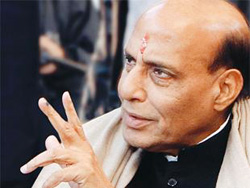New Delhi, Feb 6: Reacting cautiously to US President Barack Obama's concern about religious "intolerance" in India, government today said any "aberrations" do not alter India's history of tolerance.
Two senior Union ministers, Finance Minister Arun Jaitley and Home Minister Rajnath Singh, underlined that India was a multi-religious and multi-cultural country where communities including Muslim, Jewish, Parsis and Christians were present.
They were reacting to Obama's comment in Washington yesterday that the "acts of intolerance" experienced by religious faiths of all types in India in the past few years would have shocked Mahatma Gandhi. Earlier also, Obama, at the end of his three-day visit here last week, had made a strong pitch for religious tolerance, cautioning that India will succeed so long as it was not "splintered along the lines of religious faith".
Addressing the reporters here, Jaitley said, "That any society must be a tolerant society is a fact that each of us has to accept. It's good to be tolerant. India has a huge cultural history of tolerance. Any aberration doesn't alter the history."
He also noted that the best example of tolerance was sitting next to President Obama, that is His Holiness the Dalai Lama, when the statement was made. "It's a part of India's tolerance that even he found it comfortable and India found it comfortable to absorb him in the society," he added.
Reacting to Obama's comments, Singh said in Uttarakhand, "as far as religious tolerance is concerned, it is embedded in our Indian tradition. India is the only country in the world where all the communities including various divisions of Muslims and all sects of Christians are present...In India, Parsis and Jewish are also there."
"The biggest speciality of the Indian culture has been that there has never been discrimination on the basis of caste, community, religion or sect," the Home Minister added.





Comments
Add new comment